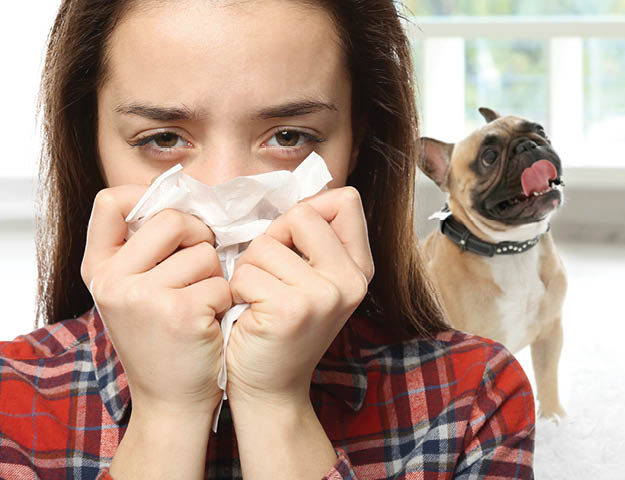Q: As my allergy symptoms increase in the spring and summer, sometimes I notice the same symptoms in my dog. Could my dog have allergies just like I do? – Laura, Sugar Hill
A: Yes, your dog could be suffering from allergies! There are primarily two types of allergies: food allergies and environmental allergies. If your pet gets itchy during spring, summer or fall, they are probably reacting to seasonal, environmental allergens. But if their symptoms continue year-round, it’s more likely their sensitivity is to something more constant in her environment or diet.
Unlike humans, whose allergy symptoms usually involve the respiratory tract, dog allergies and cat allergies more often take the form of skin irritation or inflammation; a condition called allergic dermatitis.
If your pet has allergies, their skin will become very itchy. They will start scratching excessively and may bite or chew at certain areas of their body. They may rub themselves against vertical surfaces like furniture, or rub their face against the carpet trying to relieve the miserable itchiness by any means possible.
Pets with allergies also often have problems with their ears – especially dogs. The ear canals may be itchy and inflamed as part of a generalized allergic response, or they may grow infected with yeast or bacteria. Signs your pet’s ears are giving him or her problems include scratching at the ears, head shaking, and hair loss around the ears. If infection is present there will often be odor and a discharge from the ears.
While respiratory symptoms aren’t common in pets with allergies, they do occur. A running nose, watery eyes, coughing and sneezing are typical allergic symptoms in both two- and four-legged allergy sufferers.
Typically pets with seasonal allergies to ragweed, grasses, pollens, molds and trees also develop sensitivity to other allergens inhaled through the nose and mouth. Animals with weaknesses in their lung fields can develop sinusitis and bronchitis, just as people do.
Another sign to watch for if you suspect your pet has allergies is generalized redness. Allergic pets often have puffy red eyes, red oral tissue, a red chin, red paws and even a red anus.
If you suspect your pet is suffering from seasonal or diet-related allergies get him or her to your veterinarian to discuss the many different treatment options that are available. Your pet doesn’t have to suffer, so schedule an appointment with your veterinarian so more serious conditions do not develop!

Ask Henry at sugarhillanimalhospital.com.
















